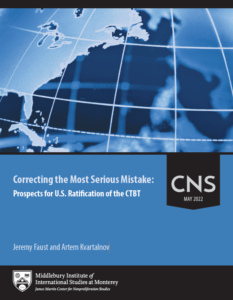May 9, 2022
Jeremy Faust and Artem Kvartalnov
Abstract
This article examines the Senate debate regarding the Comprehensive Nuclear-Test-Ban Treaty (CTBT), traces a policy history of presidential administrations toward the CTBT since that debate, makes a case for why the US should ratify the treaty, and recommends measures that may improve the prospects of US ratification in the future. Following his election as the 46th President of the United States, Joe Biden – an outspoken advocate of the CTBT in the Senate – will have to decide whether to expend political capital on securing Senate advice and consent for the treaty. While the nuclear nonproliferation regime has seen many changes since the Senate last considered the CTBT in 1999, the debate over the treaty has remained remarkably static, with Republicans arguing that the treaty is unverifiable and threatens US interests, and Democrats arguing that the treaty would lock in a US testing advantage and strengthen US global leadership. In examining the policy history of the treaty and making recommendations to facilitate US ratification, this article seeks to reinvigorate the debate over the CTBT a quarter century after it first opened for signature.
“I truly think, I honestly believe that, in the 27 years I have been here, this is the most serious mistake the Senate has ever made — or is about to make.”
Senator Joe Biden
On the Senate’s refusal to grant advice and consent to the Comprehensive Nuclear-Test-Ban Treaty US Senate, 1999

